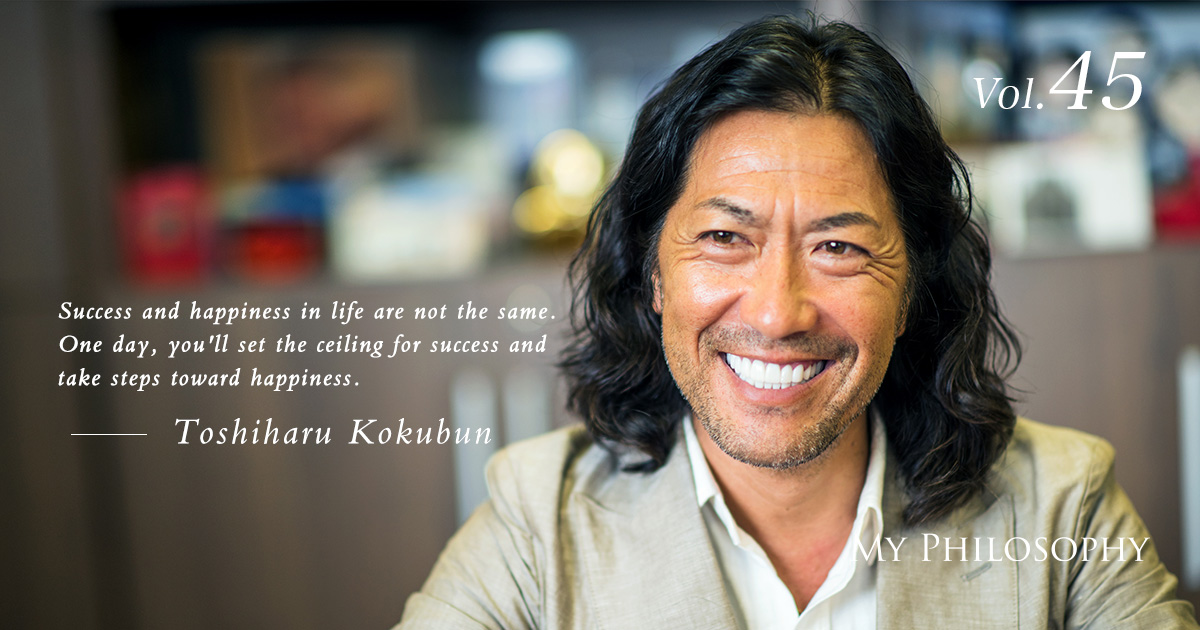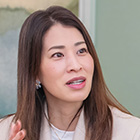
Toshiharu Kokubun, a charismatic entrepreneur who introduced a unique franchise system into the beauty salon industry and grew his business into a leading group in the sector. We delved into the inner thoughts of this reserved individual.
Profile
Vol.45 Toshiharu Kokubun
Representative Director of Earth Holdings Co., Ltd.
Born in Fukushima Prefecture in 1958. After graduating from a technical high school with a major in electrical engineering, he began working at a local sewing factory. At the age of 19, he moved to Tokyo with the aim of becoming a beauty salon owner and started working and living at a beauty salon in Shinjuku, Tokyo. After a year and a half, he became a store manager, and five years later, he managed 17 stores as a manager. At the age of 30, he started his own business. In 1989, he opened his first store in Katsushika, Tokyo. In 1995, following a visit to beauty salons in the United States, he drastically shifted his store opening strategy towards large-scale store expansion. Through a unique franchise system that produced 86 owners from among his employees, he embarked on a growth trajectory. In 2007, he opened his first overseas store, “Earth Hairdressing Oxford Circus London.” Today, the beauty salon “EARTH” has grown into a leading group in the industry, with 230 stores and 2,750 staff members domestically and internationally.
He is the author of "The Power of Steadiness to Attract Success (Seiko wo Hikiyoseru Jimichi ryoku) " (Fusosha Publishing) and "New Edition of The Power of Steadiness (Jimichi ryoku Shinban)" (PHP Institute).
*Titles and other details are as of the time of the interview (July 2016).
To Do or Not to Do

My life is simple: it’s either a yes or a no, to do or not to do. Once I decide to do something, I give it my all. I don’t do things halfway. The criteria for my decisions are whether something is enjoyable or not. If it’s enjoyable, I do it; if it’s not, I don’t. I never engage in businesses that don’t benefit people or that make people unhappy, even if they’re profitable. The notion of a middle ground, where you don’t fully commit, is the mindset of someone who isn’t using their full potential. These people are capable of more but choose not to do it.
A third-rate person is someone who tries but fails. They put in the effort and struggle, so it takes time to see results. However, many of them have the perseverance to keep going, and they don’t collapse even if they don’t succeed. There are people who, despite failing and being mocked, don’t give up. This is common to both first-rate and third-rate individuals.
When people succeed, they sometimes stop aiming for greater heights. First-rate individuals always set new goals, but third-rate people may regress after achieving some results instead of stepping up further. Second-rate people think they’re slightly above average from the start and proceed at their own pace, which leads to a decline over time. Doing nothing and expecting things to improve with time is unrealistic.
Playing the Role of an Entrepreneur
 Even if it looks like I’m playing around instead of working, I actually appreciate the gap that arises from doing my job properly. It’s problematic to appear to be working while not actually doing so, but seeming shallow while being competent can be an asset. If people find me interesting, that’s great. This might be something I can do specifically because of my profession. If I were a banker, people probably wouldn’t trust me (laughs).
Even if it looks like I’m playing around instead of working, I actually appreciate the gap that arises from doing my job properly. It’s problematic to appear to be working while not actually doing so, but seeming shallow while being competent can be an asset. If people find me interesting, that’s great. This might be something I can do specifically because of my profession. If I were a banker, people probably wouldn’t trust me (laughs).
I see myself as playing the role of a “beauty salon entrepreneur.” I have a Ferrari at home, which acts as a kind of armor for me. I own it because it’s the kind of car you might expect a beauty salon owner to drive, but I don’t actually drive it. While playing the entrepreneur, there’s always another part of me observing this role objectively. Reading various books, I’ve learned that viewing oneself objectively is akin to “detachment” in a religious sense. In the religious context, maintaining a calm mind is fundamental, and excessive display of emotions is not considered good. Personally, I am not the type to have emotional ups and downs. I don’t celebrate when I’m happy, nor do I get depressed when I’m sad. I’m just playing the role of an entrepreneur, so I don’t feel regret over failures, nor do I feel joy over successes.
The Difference Between Success and Happiness

Success, in my view, is about acquiring people, things, and money. My goals are to earn 300 million yen annually, have 100 franchise owners, and operate 200 beauty salons. Achieving these would likely make the world see me as successful. However, being perceived as successful doesn’t equate to being seen as happy. Happiness lies elsewhere. If you can’t step up to happiness after achieving success, you won’t grasp true happiness in life. Those who end with success alone ultimately don’t achieve happiness.
There’s always someone more successful, and there’s no end to success. I think that’s why I don’t feel like I’ve achieved success. Once I reach a certain goal, I set the next one. After nurturing 100 entrepreneurs, the next target becomes 150. Someday, I need to set a ceiling for success and move towards the step of happiness. I believe the definition of happiness is to use what you’ve acquired to enjoy yourself and to bring joy to others. Therefore, despite Steve Jobs, the founder of Apple, acquiring people, things, and money, I can’t help but think he didn’t find happiness and passed away without enjoying life.
Systematizing the Mindset
 What “EARTH” can achieve hinges solely on addressing the matters of the heart. Technical skills, added value services, and prioritizing customers are fundamental basics. With a staff of around 2600, it’s challenging for everyone to interact with customers with the same mindset. However, this is the crucial point for differentiating ourselves from other stores. Since it’s a person-to-person business, there’s always the factor of compatibility between customers and hairstylists. If the first impression isn’t favorable, no matter how courteous the service is, it might still feel annoying to the customer.
What “EARTH” can achieve hinges solely on addressing the matters of the heart. Technical skills, added value services, and prioritizing customers are fundamental basics. With a staff of around 2600, it’s challenging for everyone to interact with customers with the same mindset. However, this is the crucial point for differentiating ourselves from other stores. Since it’s a person-to-person business, there’s always the factor of compatibility between customers and hairstylists. If the first impression isn’t favorable, no matter how courteous the service is, it might still feel annoying to the customer.
I aim to systematize EARTH’s mindset, but in the service industry, there are limitations to what manuals and systems can achieve, making this a difficult challenge. It’s not something that can be realized immediately, so we must continue working towards it without giving up.
After achieving the goal of nurturing 100 entrepreneurs, I plan to organize that know-how and commercialize it, with the intention of expanding into Asia. At this stage, I’m considering the development of an academy to impart this know-how rather than establishing more salons.

Maybe because Mr. Sugiyama grew up in New York, he possesses the assertiveness typical of foreigners, always maintaining a positive mindset and a strong spirit of challenge. His steady approach to achieving his goals is truly admirable! Amidst all this, he also seems to cherish the traditional Japanese spirit of wabi-sabi and the samurai ethos. He reminds me of Ryoma Sakamoto, a figure who bridged Japan and the world.
I believe he has the power to change Japan. I look forward to his continued success and future endeavors!
Toshiharu Kokubun,Representative Director of Earth Holdings Co., Ltd.
I have been cutting my three sons’ hair every month ever since they were born. Back in high school, I even considered becoming a hairstylist and ordered admission documents from beauty schools. Thus, the management philosophy of Toshiharu Kokubun, the president of the major company EARTH, within an industry I have long been interested in, was very enlightening. Nurturing “entrepreneurs” is a great goal.
Having read President Kokubun’s book “The Power of Steadiness,” I resonated deeply with the idea that all outcomes can be summarized as either a yes or a no. Since then, whenever I take action, I document every action and conclude all outcomes, whether good or bad, as either a yes or a no. Surprisingly, outcomes that seem like a no at the time often turn into a yes with the passage of time.
The concept of “to do or not to do” is, I believe, the clearest principle in life. In any era, “those who do, do; those who don’t, don’t.” In English, a person who does is called a “DOER.” President Kokubun is precisely a DOER. I also aspire to continue being a DOER.
July 2016 at the Earth Headquarters Aoyama First Building.Translated by ILI Inc.




































































































































